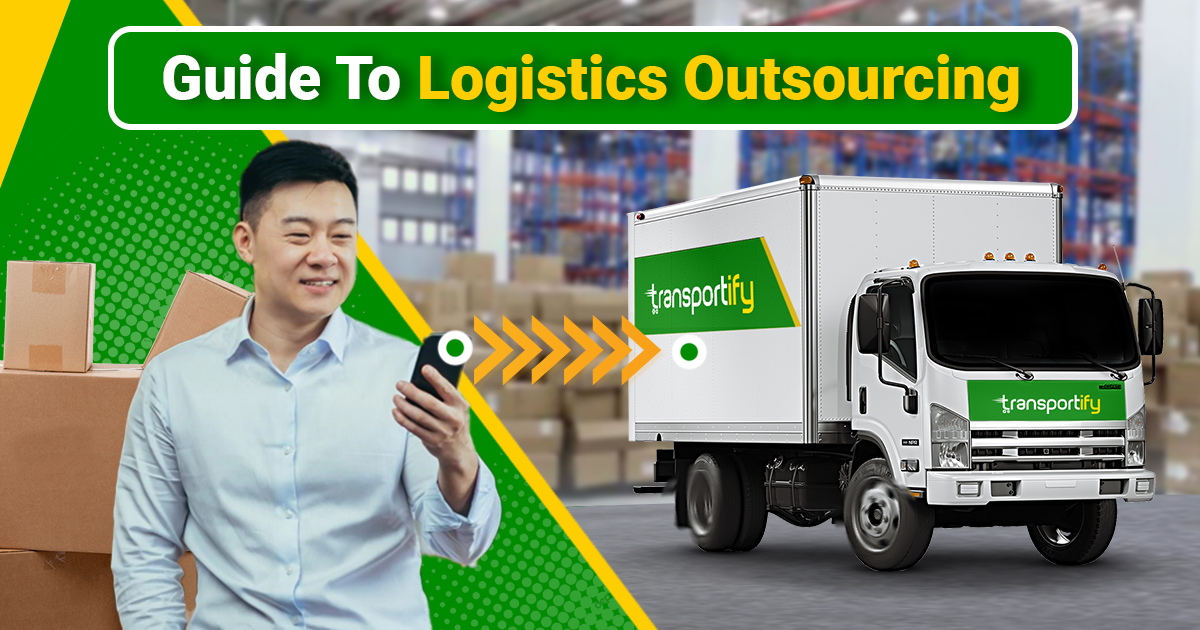
Logistics outsourcing in supply chain management is one of the most important decisions a business can make to improve its supply chain. By finding the right Third-Party Logistics (3PL) provider, businesses can outsource all or part of their logistics operations, saving time and money. This guide will discuss the benefits of logistics outsourcing, how to find the right 3PL provider, and when businesses should consider outsourcing their logistics capabilities.
What Is Logistics Outsourcing?
Logistics outsourcing in supply chain management involves contracting a company’s logistics functions to a third-party logistics provider. The 3PL provider will then manage these functions on behalf of the company. By outsourcing these logistics tasks, businesses can free up time and resources to focus on their core competencies. In other words, your business can use the 3PL’s resources and expertise to its advantage. The benefits of outsourcing logistics can be significant, and businesses should carefully consider whether or not outsourcing is the right decision for them.
Add More Value To Your Supply Chain By Improving Your Logistics
Value addition is crucial in supply chain management because it ensures that customers receive goods or services of the highest quality at the lowest possible cost. In other words, value addition makes sure that businesses can offer their customers the best possible products and services at the most competitive prices.
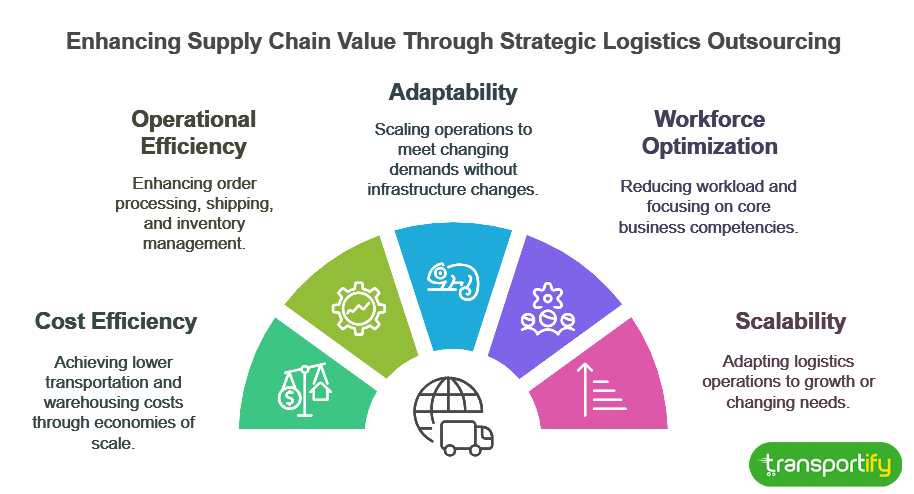
There are many ways to add value to a business’s supply chain. One of the most effective ways is by ensuring efficient and effective logistics operations. Logistics outsourcing in supply chain management is a key strategy to achieve this goal. The benefits of logistics outsourcing can provide significant advantages, including:
Cost Efficiency
Logistics outsourcing can help businesses reduce costs in many ways. First, it allows businesses to take advantage of the economies of scale that 3PLs enjoy due to their larger size. This means that businesses can benefit from lower pricing on transportation and warehousing services. Additionally, 3PLs often have more efficient processes than businesses, which can lead to reduced labor and inventory costs.
Improved Operational Efficiency
By outsourcing their logistics operations, businesses can tap into the expertise and experience that 3PLs have in this area. This can lead to improvements in order processing, shipping, and inventory management.
Enhanced Ability To Adapt To Changing Demands
When a business’s logistics operations are outsourced to a 3PL, it can free up resources within the firm that can be used elsewhere, enhancing scalability. This increased capacity allows businesses to support growth or improve overall performance. 3PLs typically provide a wide range of vehicles that companies can use without the need to invest in trucks or light commercial vehicles.
| Vehicle Type | Dimensions/ Weight Limits | Base Price (Metro Manila) | Base Price (Outside Metro Manila) | Base Price (Visayas/Mindanao) |
|---|---|---|---|---|
 Wing Van Wing Van | 32 to 40 x 7.8 x 7.8 ft 12000kg to 28000kg | 7000 PHP | 6500 PHP | 6500 PHP |
| 18 x 6 x 7 ft 7000kg | 4850 PHP | 4850 PHP | 4850 PHP | |
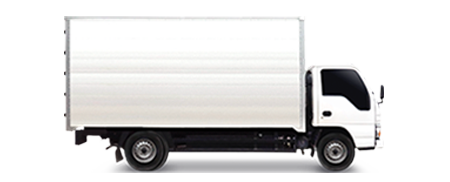 Closed Van Closed Van | 10 to 14 x 6 x 6 ft 2000kg to 5000kg | 1600 PHP | 1450 PHP | 1450 PHP |
 Open Truck Open Truck | 10 to 21 x 6 ft x open 2000kg and 7000kg | 2300 PHP | 1950 PHP | 1950 PHP |
 L300/Van L300/Van | 8 x 4.5 x 4.5 ft 1000kg | 415 PHP | 374 PHP | 335 PHP |
 Small Pickup Small Pickup | 5 x 5 ft x open 1000kg | 418 PHP | 338 PHP | 325 PHP |
| 5.5 x 3.8 x 3.8 ft 600kg | 375 PHP | 292 PHP | 275 PHP | |
| 5 x 3.2 x 2.8 ft 200kg | 240 PHP | 210 PHP | 160 PHP | |
| 3.5 x 2 x 2.5 ft 200kg | 220 PHP | 190 PHP | 140 PHP |
Lower Workload And Better Use Of Workforce
Businesses often find it difficult to recruit and retain qualified staff for their logistics operations. By outsourcing these functions to a 3PL, businesses can relieve themselves of this burden and focus on their core competencies.
Greater Focus on Core Competencies
By outsourcing their logistics operations, businesses can focus on their core competencies and leave the logistics tasks to experts in this field. This can lead to improved performance in terms of innovation and customer service.
Enhanced Scalability
Outsourcing provides scalability for a business’s logistics operations as it grows or changes its needs over time. A 3PL can easily adapt to these changes without requiring modifications to the business’s infrastructure or processes.
Actionable Data From 3PL’s Reports
A 3PL can provide greater visibility into a company’s supply chain processes through detailed reporting, helping businesses manage risks and improve performance.
When to Do Logistics Outsourcing in Supply Chain Management?
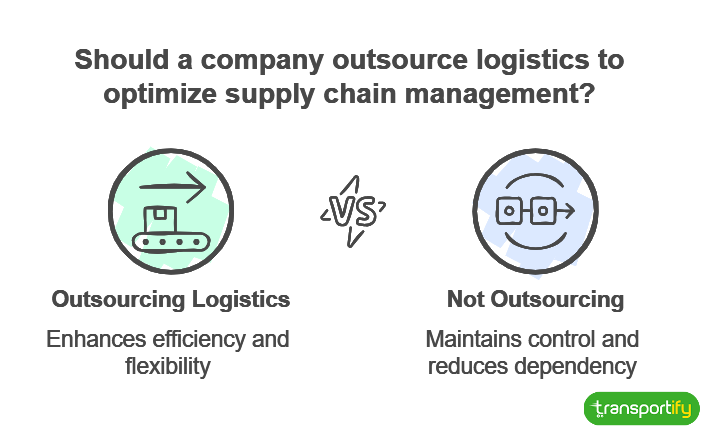
Logistics outsourcing can be a great way for businesses to improve their supply chain management. However, it is not always the right decision for every company. There are a few factors that businesses should consider when deciding whether to outsource logistics:
The Size and Complexity of Your Operations
Outsourcing logistics can be an excellent way to reduce the complexity of your supply chain. If you operate a complex or large-scale operation, it may be helpful to outsource certain aspects of your logistics to a 3PL provider. This will help manage your supply chain more effectively and optimize your resources.
The Need for Specialized Expertise
If your business lacks in-house logistics expertise, consider outsourcing. A 3PL provider will have the knowledge and experience necessary to manage your supply chain effectively. A great example is how it plays a vital role in the agricultural supply chain nowadays. They can provide specialized services that might be difficult or expensive for your business to replicate internally.
The Need for Economies of Scale
It is important to operate at scale to maximize efficiency and reduce costs. By outsourcing logistics, businesses can take advantage of the economies of scale offered by 3PL providers. This allows for significant time and cost savings on transportation, warehousing, and inventory management.
The Need for Flexibility
One of the benefits of outsourcing your logistics is the flexibility it offers. A 3PL provider can adapt quickly to changing market conditions and needs while allowing the business to maintain control over strategic aspects of its supply chain. This flexibility can be crucial during periods of rapid growth or unexpected changes in demand.
SEE ALSO
When Not to Do Logistics Outsourcing in Supply Chain Management?
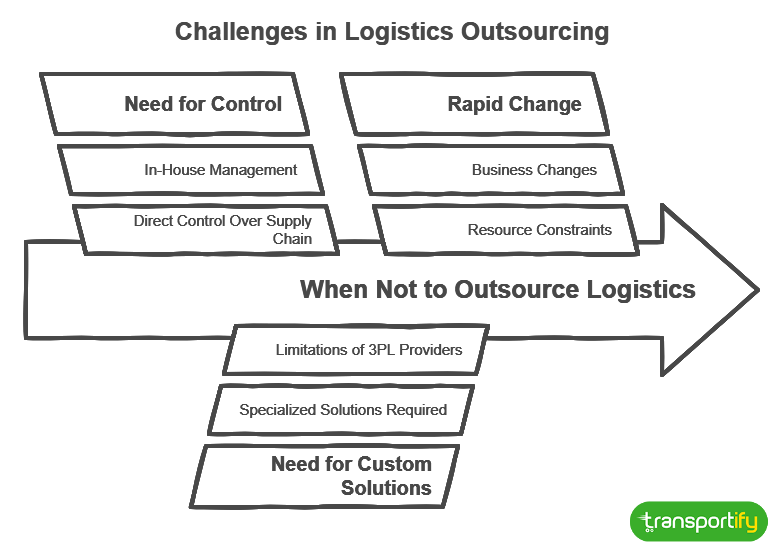
There are also certain situations where businesses should refrain from outsourcing their logistics operations. Here are a few instances when outsourcing may not be the best option:
When You Need Direct Control Over Your Supply Chain
If maintaining direct control over all aspects of your supply chain is essential, outsourcing may not be the best solution. It may be more effective to retain these operations in-house.
When You Need Specialized or Custom-Made Solutions
If you require customized or specially tailored solutions, a 3PL provider may not be able to meet those needs. In this case, it may be more prudent to manage these aspects internally. However, many 3PLs can cater to customized requirements and create tailored Standard Operating Procedures (SOPs) .
Transportify is one of the leading 3PLs in the Philippines that delivers customized SOPs and services for your logistics requirements. Whether you need a particular type of vehicle, or want detailed documentation services at every drop-off, Transportify can assist.
When You Are Undergoing Rapid Change
If your business is experiencing a period of significant change, you may not have the time or resources necessary to manage an outsourced logistics operation effectively. In such cases, it may be best to wait until things stabilize before considering outsourcing logistics.
Things You Should Do to Find the Right 3PL
Once a business has decided to outsource its logistics, there are a few steps it should take to find the right 3PL provider:
Evaluate Your Needs
Before you can begin searching for a 3PL provider, you must evaluate your needs. What logistics functions would you like to outsource? What are your priorities? What constraints do you have?
Create a Request for Proposal (RFP) Document
This document should outline the specific logistics functions the company wants the 3PL provider to manage, alongside the company’s requirements and expectations.
Research 3PL Providers
Once you have a good idea of what you’re looking for, it’s time to start researching potential 3PLs. Several 3PLs are available, so it is important to find one that fits your unique needs.
Compare Quotes
After narrowing down your list of potential providers, request quotes from them. This will give you a good sense of what each provider charges and how they compare in terms of cost and services.
Evaluate Proposals
Send out the RFP to several potential 3PL providers and evaluate their proposals. It is crucial to compare not only pricing but also the quality of service and capabilities of each provider.
Consult with Transportify
Share your specific requirements with Transportify for tailored assistance that aligns with your logistics needs.
Make a Decision
Once you’ve compared quotes and identified a 3PL provider that aligns with your needs, it’s time to decide. Read the contract thoroughly and address any questions before signing. After selecting a 3PL provider, the company should collaborate with the provider to formulate a detailed plan specifying how the logistics operations will be managed. This plan should be regularly updated to fulfill the company’s evolving needs.
 | or |
Frequently Asked Questions:
What is logistics outsourcing in supply chain management?
🚚 Logistics outsourcing refers to hiring a third-party logistics provider (3PL) to handle part or all of your company’s supply chain functions. These may include transportation, warehousing, and more specialized operations like inventory management and order fulfillment. Many businesses choose to outsource logistics to improve efficiency and save costs.
What should businesses do before logistics outsourcing in supply chain management?
🚚 Before deciding to outsource logistics, a business should identify its needs and determine what type of outsourcing would be the best fit. This includes researching various 3PL providers in the market to find the most suitable option. Each business is unique and will have differing needs at various times. Generally, businesses should consider outsourcing logistics when they lack the internal resources or expertise to manage it effectively.




 INSTANT QUOTE
INSTANT QUOTE

 Chat
Chat